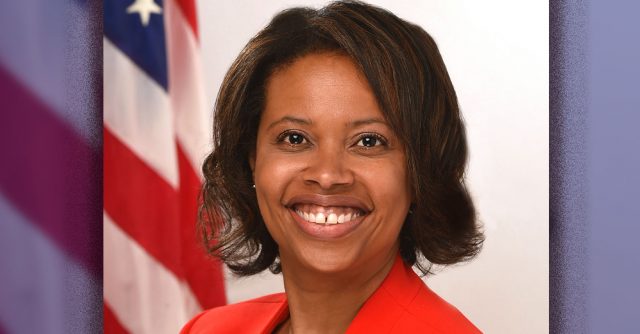By Stacy M. Brown
NNPA Newswire Senior National Correspondent
A White House photo featuring dozens of African American members of the Biden-Harris administration circulated the internet during the opening days of Black History Month, and one would be hard-pressed to find anyone as proud as Chiquita Brooks-LaSure.
The first Black woman to lead the Centers for Medicare and Medicaid Services (CMS), Brooks-LaSure offered the brightest smile when mentioning the historic photo that featured Vice President Kamala Harris and a host of Black staffers who help push the administration’s work forward.
“I’m so proud and really moved,” the Philadelphia-born Brooks-LaSure asserted.
“When I got nominated, I heard from women across the country, and I didn’t realize how meaningful it would be for so many people for me to sit in this chair,” she continued.
“I have older women and younger women come up to me and say how proud they are. That really fuels me to want to use this role in a way to change people’s lives, and I feel so grateful for that opportunity.”
“The National Newspaper Publishers Association (NNPA) resolutely salutes and congratulates Chiquita Brooks-LaSure for her outstanding leadership at Health and Human Services (HHS) CMS. We look forward to expanding the partnership between CMS and the NNPA. Medicare and Medicaid are vital to the present and future of African Americans and other communities of color,” affirmed Dr. Benjamin F. Chavis, Jr, NNPA President and CEO.
A former policy official who played a crucial role in guiding the Affordable Care Act – or Obamacare – through passage and implementation, Brooks-LaSure enjoys decades of experience working in government and the private sector.
As deputy director for policy at the Center for Consumer Information and Insurance Oversight, and earlier at the Department of Health & Human Services as director of coverage policy, Brooks-LaSure led the agency’s implementation of Obamacare coverage and insurance policy provisions.
She assisted the House of Representatives leaders in passing several healthcare laws, including the Medicare Improvements for Patients and Providers Act of 2008, as part of the Democratic staff for the House’s Ways and Means Committee.
As administrator for CMS, Brooks-LaSure oversees programs that include Medicare, Medicaid, the Children’s Health Insurance Program, and the HealthCare.gov health insurance marketplace.
“I was born in Philadelphia, raised in New Jersey, and have been living in Virginia for a big chunk of my life,” said LaSure, who’s married with a young daughter.
“I was always interested in policy from a young age,” she explained.
“When I was in graduate school, I had a friend who I took health policy and social policy, and she really got me on the healthcare policy track. I always said, ‘once you start on health, you never look back because there’s no policy area that has the ability to touch so many lives, especially in the federal government.”
The COVID-19 pandemic has upped the pressure on CMS and other agencies, but Brooks-LaSure recalled similarities to when the ACA became law.
“The ACA was born out of a difficult time,” she recalled.
“Before we passed the law, not everyone thought we should focus on health policy. We had the Great Recession, and one of the pieces of people’s financial security was healthcare because one out of every three bankruptcies resulted from medical costs.
“So, it became imperative to pass the ACA, and I think we’re at the same moment today. The pandemic has made it more difficult in terms of wanting to do so many things with healthcare policy.”
Brooks-LaSure asserted that Americans now have a greater appreciation of why healthcare is vital and why the uninsured and those not having access to vaccines and drug treatments affect everyone.
“I think people have seen health disparities at a different level,” she stated.
“I think we now have an opportunity to address those [disparities] if we seize this moment.”
6 Strategic Pillars
To that end, Brooks-LaSure noted the six strategic pillars by which CMS would achieve its mission and measure success:
–Advance health equity by addressing the health disparities that underlie America’s health system
–Build on the Affordable Care Act and expand access to quality, affordable health coverage, and care
–Engage partners and the communities CMS serve throughout the policymaking and implementation process
–Drive innovation to tackle the health system challenges and promote value-based, person-centered care
–Protect CMS programs’ sustainability for future generations by serving as a responsible steward of public funds
–Foster a positive and inclusive workplace and workforce, and promote excellence in all aspects of CMS’s operations
Brooks-LaSure said CMS has already made significant progress on those pillars, focusing efforts on improving health equity and access to coverage by working across all federal agencies.
She told NNPA Newswire that a record 14.5 million signed up for 2022 health care coverage during the enrollment period.
“Investing in financial assistance and outreach allows more people to have access to the care that they need,” Brooks-LaSure stated.
As part of Vice President Kamala Harris’s Call to Action to Reduce Maternal Mortality and Morbidity, HHS, through CMS, has taken steps to improve maternal health and support the delivery of equitable, high-quality care for pregnancy and postpartum care.
CMS has proposed a “Birthing-Friendly” designation to drive perinatal health outcomes and maternal health equity improvements.
According to a release, the designation would initially identify hospitals that provide perinatal care, participate in a maternity care quality improvement collaborative, and implement recommended patient safety practices.
CMS has also encouraged states to take advantage of the American Rescue Plan’s option to provide 12 months of postpartum coverage to pregnant individuals enrolled in Medicaid or CHIP.
Brooks-LaSure said history would ultimately smile upon the unprecedented diversity.
“I think that representation matters so much, and we will have changed this country because so many of us are in these roles with our diverse perspectives strengthen policymaking,” Brooks-LaSure said.
“The more you have people who come from different experiences, you make stronger and better policies and making sure the next generation see they can sit in these roles.”




